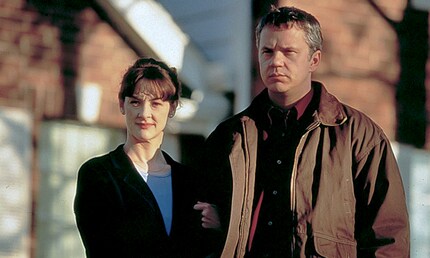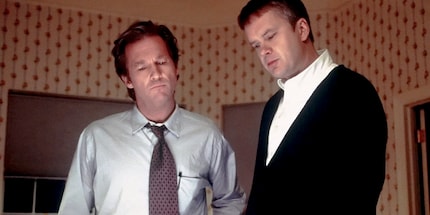
Review
«Morbius» is one big disappointment
by Luca Fontana
Your neighbour. Your friend. Or terrorist. In the 1999 thriller "Arlington Road", Jeff Bridges, who plays the main character, isn't the only one in the dark; the audience is too.
First things first: this article contains no spoilers. You won't learn anything that hasn't already been revealed through the trailers.
These films exist. We see them for a few weeks in cinemas and then they disappear without us really having heard anything about them. Then a few months pass. Maybe even years. Subjects that interested hardly anyone at the time suddenly become popular and, overnight, the forgotten film is back on everyone's lips.
"Arlington Road", released in cinemas in 1999, is one such film.
Michael Faraday (Jeff Bridges), a history professor at George Washington University, is also an expert on American terrorism. His wife, a former FBI agent, lost her life three years earlier during a failed mission. Since then, Faraday has been obsessed with terrorism research. With his new partner, however, he looks after his young son very well.
When the Lang family move into the house next door on Arlington Road one day, Faraday is relieved: his son has a playmate the same age, and he finally has a friend, Oliver Lang (Tim Robbins), to talk to about the traumatic death of his wife.
Everything seems to be going swimmingly. But then Faraday notices more and more inconsistencies in the Langs' lives. The deeper the terrorism expert digs into the new neighbour's past, the more his worst fears seem to come true:
Is Lang a terrorist?
Is Lang a terrorist?
Why am I writing a film review of 1999's "Arlington Road"? Thanks to you. In my Trailer Tuesday on "craziest film endings of all time", I didn't mention "Arlington Road". I didn't know that film. Many of you have remarked it. Notably blackhat:
The craziest movie endings without ARLINGTON ROAD???? Really? ^^
I've made a deal with blackhat: I watch the film, write a review, then we continue our discussion. You are, of course, welcome to join us. I'm even asking you to. Because, yes, 'Arlington Road' doesn't lack salt and the subject matter - terrorism - is not to be taken lightly.
Certainly, it wasn't uncharted territory for America in 1999 either. But it wasn't until the terrible attacks of September 11 that the country and the entire Western world began to understand what terrorism really is. What it means to be afraid when you no longer feel safe in your everyday life.
It's a more than unpleasant feeling.

In the film, Faraday, played by Jeff Bridges, says that people tend to jump to conclusions or look for someone to blame a little too quickly in order to find a scapegoat. Because: imagine if you'd actually experienced something that horrible. How would you feel if, the next day, you saw images on television of the perpetrator, dead or alive?
Soulful, said Faraday to his class.
Of course. Only then could the much-needed, existential sense of security and safety slowly return. The culprit would be put away, the danger averted. Fortunately.
But this is exactly where Faraday comes in: how can we be sure that the authorities will investigate these cases with the necessary care? That they have acted not just in the interests of the public's need for a quick explanation, but in the interests of real safety? Which, having said that, would be more painful and therefore less popular. But in the long term, it's probably the option that makes the most sense. Faraday asks the question: can we really trust the investigating authority?
You see, paranoia?
Faraday is obsessed. His mistrust turns into paranoia. Both consciously and unconsciously. On the one hand, he's the one who warns his pupils on a class trip that investigations carried out out of fear and therefore in haste into a right-wing extremist would have led to erroneous conclusions.
On the other hand, his main academic conviction is that terrorist events are never the work of individuals alone. He is therefore in constant contradiction with many investigations that have already been completed.
For example, the suicide bombing of a public building in St Louis*, in which dozens of children also died. The facts seem clear: the authorities point to the work of a single individual who died in the explosion. But Faraday casts doubt on the official theory. Because if we dug a little deeper, it would be out of the question to consider the individual perpetrator as a single criminal: others were involved.
"But we don't want other culprits," he tells his students. "We want one man. One name. And as quickly as possible. That's what makes us safe."

In the midst of all the thoughts that occupy his mind and can't get out of his head, there appears the sinister new neighbour played by Tim Robbins: Oliver Lang. Is he really as harmless as he claims? Faraday's keen eye for Lang's past raises questions. He wonders about his integrity. Lang is definitely hiding something.
Paranoia can be very dangerous.
It's getting harder and harder to see straight. To think. To unravel the mystery. Faraday's delusion, which may or may not be a delusion, clouds judgement. Faraday himself draws erroneous conclusions from supposed facts, but so does the viewer. Sometimes. But not always. You can never be sure of anything when you watch "Arlington Road".
And it's wonderfully refreshing.
This is a positively treacherous game that director Mark Pellington and screenwriter Ehren Kruger play with the audience. They constantly present facts that are open to different interpretations. This means that viewers can never really be sure they're holding on to the right truth.
The two lead actors, Jeff Bridges and Tim Robbins, make a significant contribution to this. Because it's on them that the whole plot hinges. Without exception. Because there are virtually no action scenes. Just as few complex sets or exuberant special effects. "Arlington Road" is a film whose story alone is enough to create an incredibly fascinating appeal that captivates from the first to the last second. A thriller from start to finish. Shame, that doesn't happen more often.

Only at the end does the plot deliberately suspend the audience's disbelief. Those who manage to do so face an ending with fanfare that couldn't be more shattering. And here I agree with blackhat: clearly, the film would have been in my top 5 craziest film endings.
*By the way: the St. Louis bombing is fictional in the film, but is based on the bombing that actually took place in 1995, targeting the Alfred P. Murrah Federal Building in downtown Oklahoma City.
I write about technology as if it were cinema, and about films as if they were real life. Between bits and blockbusters, I’m after stories that move people, not just generate clicks. And yes – sometimes I listen to film scores louder than I probably should.
Which films, shows, books, games or board games are genuinely great? Recommendations from our personal experience.
Show all